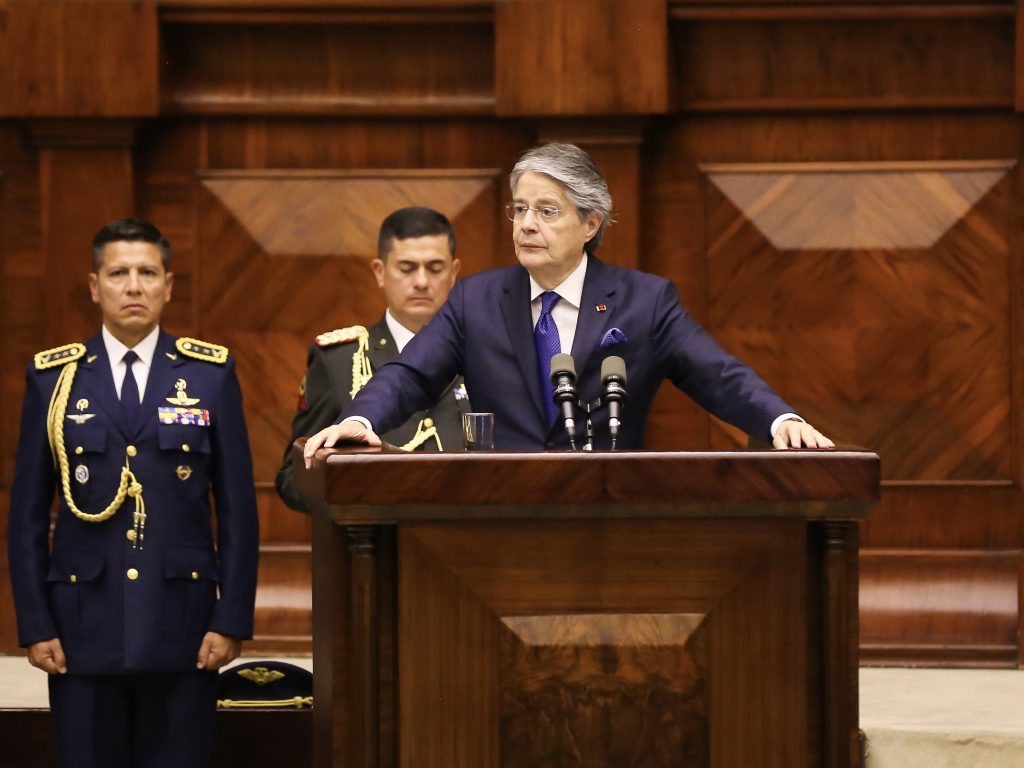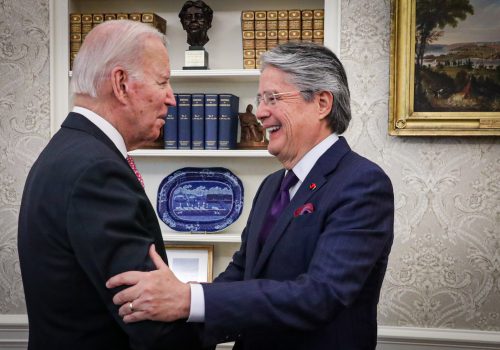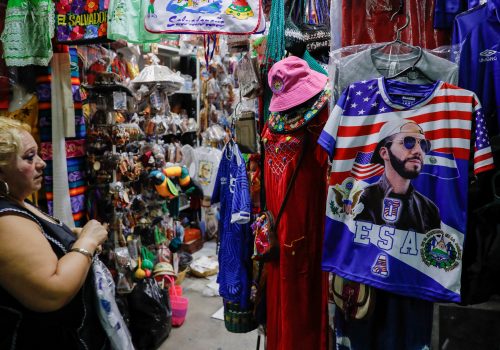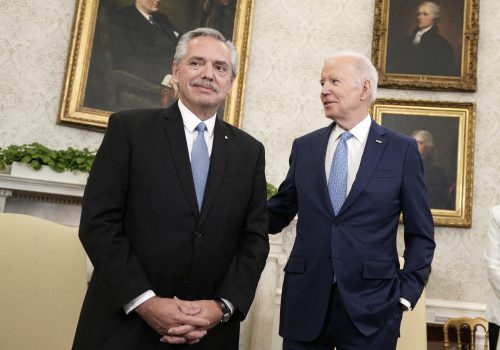Death is not the end, apparently. Ecuadorian President Guillermo Lasso on Wednesday invoked a rare constitutional mechanism called “muerte cruzada,” or “mutual death,” to dissolve the National Assembly before an imminent impeachment vote on embezzlement allegations. Lasso will now rule by decree for six months until new presidential and legislative elections are held. Below, experts from the Adrienne Arsht Latin America Center share their insights on four big questions around what this means for the country of eighteen million people and why it matters for the region and beyond.
1. At an Atlantic Council event in Washington less than six months ago, Lasso declared that Ecuador “has fully returned to democracy.” What is the impact of this decree on Ecuador’s democratic institutions?
Ecuador’s constitution is unique in that it allows the president to dissolve congress in three instances. In this case, Lasso’s reasoning is that his actions are warranted under the third instance: “political crisis and internal commotion.” From his perspective, this is true since congress began impeachment proceedings to remove him from office on May 16. From the opposition’s viewpoint, represented by Rafael Correa, a former Ecuadorian president who currently lives abroad, it is Lasso who is creating internal commotion. Importantly, the decree ensures that new elections must be held for president and congress. Already, Ecuador’s armed forces and national police have been clear that personnel will respect the constitution, which does allow for dissolving congress under Article 148.
—Jason Marczak is the senior director of the Atlantic Council’s Adrienne Arsht Latin America Center.
It is very important to clarify that this movement by Lasso to activate the “muerte cruzada” is defined by Article 148 of Ecuador’s constitution. It will basically dissolve the National Assembly and call for new elections in six months’ time. This election includes the president and vice president positions. He will not acquire total governing powers. The only laws that he can expedite during these six months are executive decrees on economically urgent laws that have to be sanctioned by the constitutional court.
—Felipe Espinosa is the executive president of Cámara de Comercio Ecuatoriano Americana (AMCHAM).
The decision made by Lasso once again highlights the significant challenge of protecting democracy in Latin America. While the decision is in accordance with Ecuador’s constitution and a response to internal political complexity, the effective functioning of democracy relies on a balanced distribution of power. Governing through decrees diminishes one of the crucial checks on power—the National Assembly.
—Fernando Larraín is a nonresident senior fellow at the Atlantic Council’s Adrienne Arsht Latin America Center.
2. Is there anything Washington can or should do to respond?
Ecuador has become one of the United States’ closest partners in the hemisphere over the last few years. In December 2022, just days before Lasso met with US President Joe Biden at the White House, Congress approved the bipartisan United States-Ecuador Partnership Act—historic legislation given its singular focus on advancing the bilateral relationship in areas such as economic and commercial ties, the environment, and security. Congress has since then taken additional action. In March, Senators Bob Menendez (D-NJ) and James Risch (R-ID) have again led legislation focused on the bilateral partnership with the introduction of the Innovation and Development in Ecuador Act of 2023, which would include Ecuador in the Caribbean Basin Economic Recovery Act.
The last six months have again reinforced the focus on Ecuador among many in Washington. What is needed now is continued support and vocal messages across the US political spectrum reinforcing the importance of the democratic process and for stability in Ecuador at a time in which the streets may erupt at any point.
—Jason Marczak
The United States should have a continuous policy toward the region to enhance democratic values and institutions. Only economic prosperity in the region will guarantee that the people there view the rule of law and other long-term institutions as the solution instead of populist offerings. Poverty and inequality are never good advisors, more so when you talk about values with people struggling to make a day-to-day living. This mandate requires a long-term commitment of the United States to its allies in Latin America, through economic and social programs and support for trade.
—Felipe Espinosa
3. How do you see Lasso’s “rule by decree” tenure playing out?
Lasso’s decision to govern by decree is poised to embark on a challenging journey, with its overall impact yet to be determined. Upon invoking Article 148 today, he also introduced his first decree law, effectively reducing taxes and offering much-needed relief to Ecuadorian families. Additionally, Lasso is likely to push forward with labor reform and investment reform, both of which have long been stalled in congress. These reforms have the potential to bring positive impacts to Ecuadorian families by addressing crucial aspects such as hourly employee compensation, part-time work, and fair wages. While these reforms are likely to take place, the road ahead will be tumultuous.
As expected, many members of congress do not align with Lasso’s decision to govern by decree, and it is likely that supporters of the impeachment will voice their discontent on the streets of Ecuador, potentially leading to protests similar to those witnessed in June and July of last year. The possibility of such protests, capable of paralyzing the Ecuadorian economy, adds complexity to Lasso’s governance under the “rule by decree” strategy. Navigating this challenging environment may overshadow the potential benefits these reforms can bring.
—Isabel Chiriboga is a program assistant at the Atlantic Council’s Adrienne Arsht Latin America Center.
4. Why does this matter for the United States? What are the implications for broader hemispheric stability?
Ecuador’s stability matters far beyond the country’s borders given its role as an important US partner. Ecuador made a clear decision a few years ago to strengthen its relationship with the United States. The hemisphere is thus looking at how that decision affects the country’s trajectory at a time of growing competition with China.
—Jason Marczak
Over the years, Ecuador has emerged as a strong US partner in the hemisphere, maintaining a close alignment with the United States amid shifting government ideologies across the region. However, the ongoing political crisis in Ecuador, fueled by pressing concerns such as inequality, insecurity, and the government’s struggle to address the basic needs of its citizens, raises concerns about the relevance of the United States in the region. Once seen as an example of economic stability, Ecuador will now face uncertainty as it approaches presidential elections in six months. In general, the United States finds itself with diminishing influence in Latin America. This situation creates an opportunity for broader Chinese influence to gain traction in the region. As Ecuador’s political landscape evolves, it becomes crucial for the United States to reassess its approach and take meaningful steps to maintain and strengthen its ties with Latin American countries.
—Isabel Chiriboga
It is worth noting that Ecuador’s neighboring countries are grappling with greater internal political challenges, suggesting that the impact of this decision may not extend beyond Ecuador’s borders. Nevertheless, we can expect months of uncertainty, which will inevitably influence investment decisions and the financial market in Ecuador as governance dynamics are affected. In the upcoming months, Ecuador will undergo a political process where the focus may shift from addressing citizen concerns to matters of political power.
—Fernando Larraín
Further reading
Thu, Dec 22, 2022
Why Ecuador’s president announced his re-election plans in Washington
New Atlanticist By
At an event co-hosted by the Atlantic Council at the Inter-American Dialogue, Ecuadorian President Guillermo Lasso announce his plans to run for re-election in 2025—and hinted that Washington could be a useful campaign ally.
Wed, Mar 29, 2023
How can Latin America halt its democratic backsliding? And how can the US help?
New Atlanticist By
All aid either hinders or helps democratic development, and donors to Latin America should be intentional about aligning all forms of assistance to make sure they support countries’ democratic development.
Fri, Mar 31, 2023
The US and Argentine presidents left the most important words unsaid
New Atlanticist By Isabel Bernhard
Two issues—lithium and China—seem to have been sidestepped when Argentine President Alberto Fernández visited US President Joe Biden in Washington this week, but both are critical to the future of US-Argentina relations.
Image: Guillermo Lasso, President of Ecuador, speaks during a session of the National Assembly.



